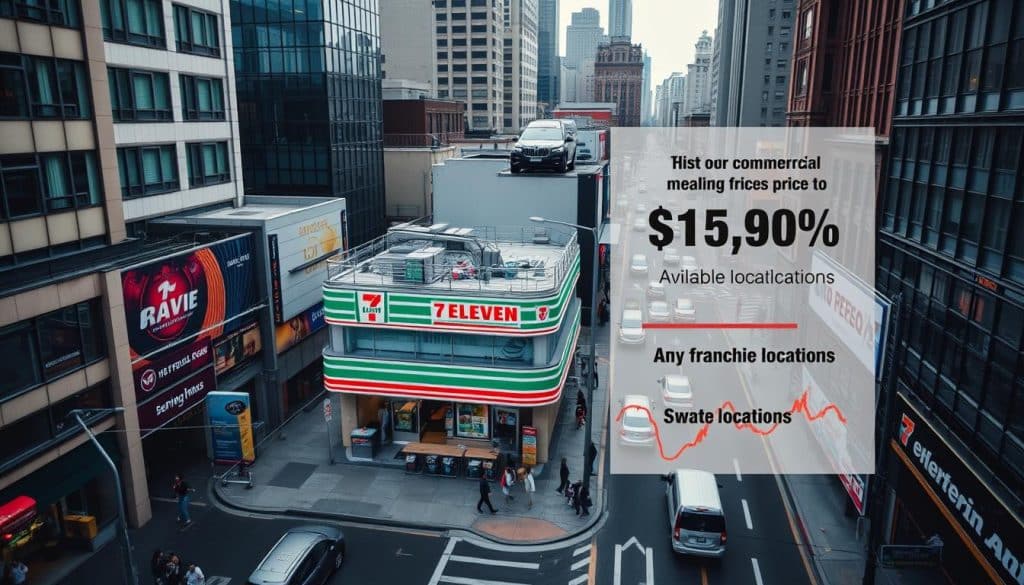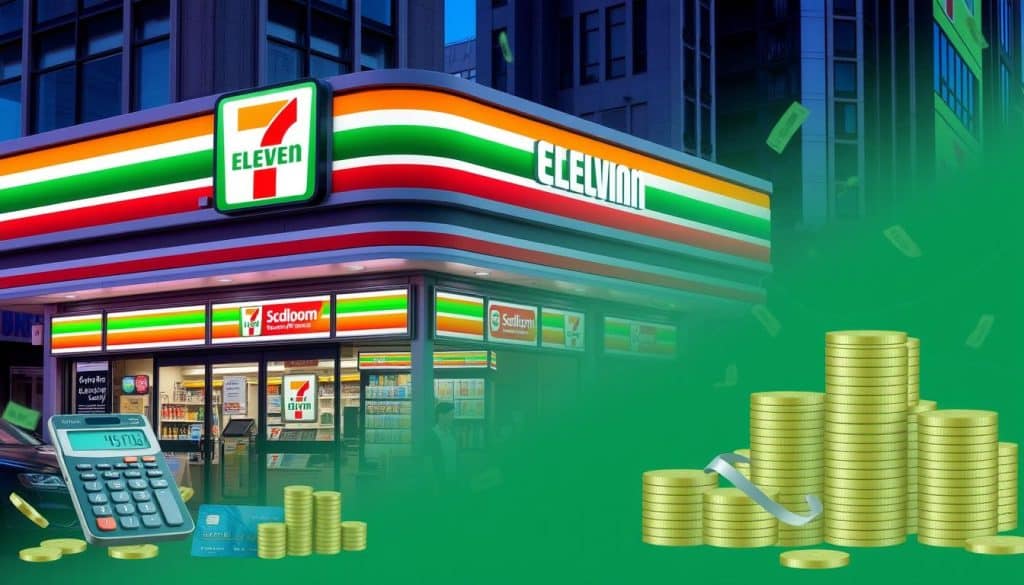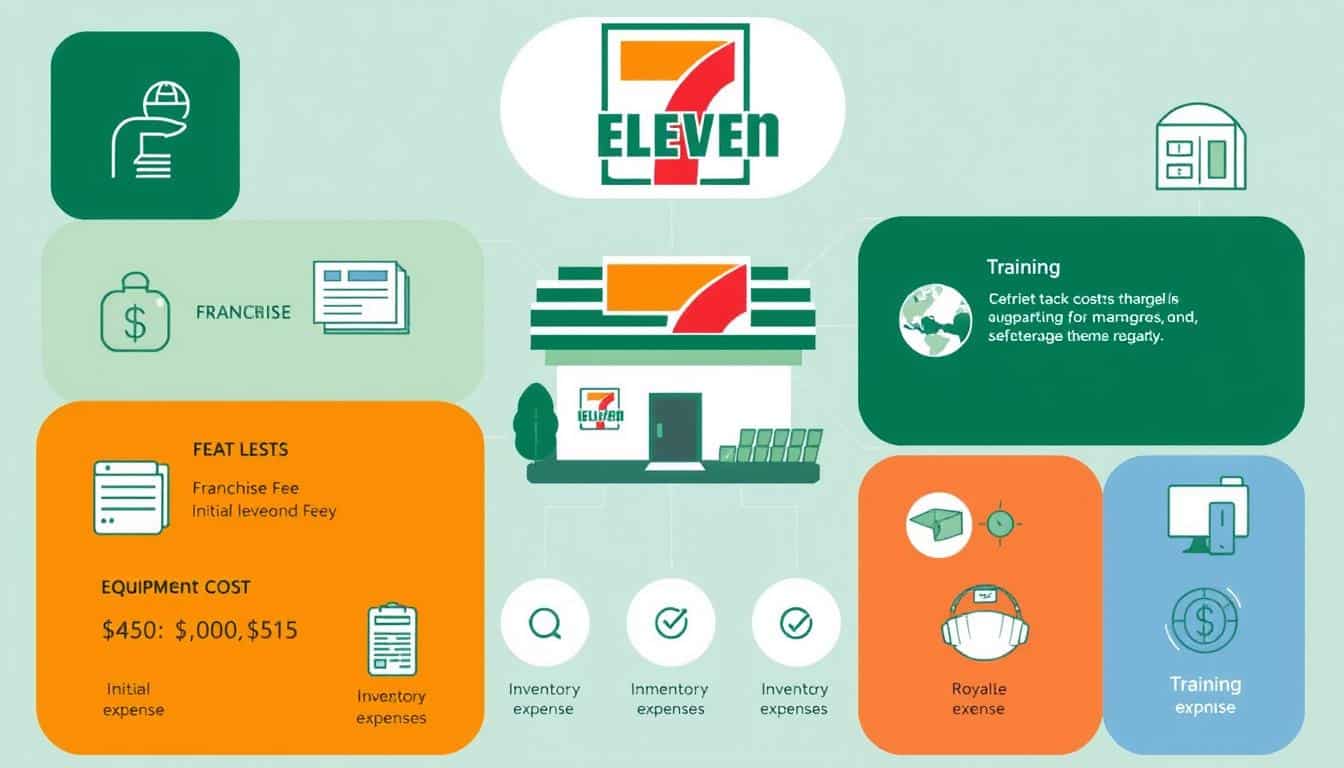Ever thought about owning a franchise but worried about hidden costs? Many dream of financial freedom but don’t know the full cost of a 7 eleven franchise. It can be a big surprise.
Thinking about a 7 eleven franchise? You need to know all the costs, from the initial fees to daily expenses. This guide will help you understand the costs and how to start a 7 eleven franchise. Knowing these details helps you prepare and manage your business better.
Key Takeaways
- The franchise fee for a 7-Eleven typically ranges from $10,000 to $1,000,000.
- The total initial investment can vary significantly, from $37,550 to $1,149,900.
- Liquid asset requirements for a 7-Eleven franchisee usually range from $50,000 to $250,000.
- Understanding the royalty and profit-sharing model is key, as it’s often 50/50.
- Franchisees get extensive training on all store operations.
- They must present a detailed business plan for their growth strategies.
- Starting a 7-Eleven requires a strong background in retail or management.
Overview of 7 Eleven Franchise
The 7 Eleven franchise is a big chance for entrepreneurs to get into the convenience store business. It started in 1927 in Dallas, Texas, as Tote’m stores. Now, it’s a key part of American retail, with over 9,400 stores across the U.S. Each store serves about 1,100 customers every day.
History of 7 Eleven in the United States
The franchise has grown by adapting to what customers want. It was a new idea back then, with long hours and a wide range of products. Today, it keeps growing, using its past success to meet today’s needs.
Business Model and Operations
Being a 7 Eleven franchise owner is special. You get a lot of help, like training in how to run the store and manage money. You also get a share of the profits, which is different from other franchises. This lets you run your store while using a well-known brand.
Key Features of Franchise Ownership
Being a 7 Eleven franchise owner means you get a strong brand and support. The cost to start is between $42,300 and $141,100, with a $40,000 fee. You’ll need $50,000 to $250,000 in liquid assets and $100,000 to $250,000 in net worth. These details make 7 Eleven a good choice for those wanting to own a business.
Initial Franchise Fees
Understanding the financial side of a 7-Eleven franchise is key. The initial franchise fee is about $40,000. This fee lets you use the 7-Eleven brand and get support.
The total cost to start a franchise is between $42,300 and $143,100. This depends on the location and store needs. It’s important to look at these costs carefully.
Breakdown of Initial Costs
Starting a 7-Eleven franchise comes with various costs. You’ll need to pay for training, equipment, and signage. The franchise fee helps cover these costs and more.
The FTC says this fee shows you’re committed to the brand. It means you’ll get help as you start your business.
Royalty Fees Explained
Franchisees also pay ongoing royalty fees. These are about 50% of your profits. They help keep the support from 7-Eleven going.
It’s important to understand these fees. They can affect how much money you make. When thinking about starting a franchise, remember both the initial fee and ongoing costs. For more info, check out this resource.
Total Investment Estimates
Starting a 7 Eleven franchise requires understanding the total investment needed. The cost usually ranges from $42,300 to $143,100. This includes initial setup, equipment, and inventory costs.
Average Investment Range for New Franchisees
Franchisees must plan carefully and assess their finances. The average investment in a 7 Eleven franchise fits within the given range. They need to consider various expenses for their business, affecting the initial costs.
Factors Affecting Investment Costs
Several factors influence the total investment. Location is key, as high-demand areas raise rental prices. Store size and property condition also matter. Franchisees should have between $50,000 to $250,000 in liquid assets for initial operations.
Location and Real Estate Costs
Choosing the right location is key for a successful 7 eleven franchise. Foot traffic, visibility, and who lives nearby are important. Knowing these can help make your business profitable.
Site Selection Criteria
When picking a site, franchises need to do a thorough check. Look for places with lots of people walking by and easy access. It’s also good to be near other businesses to attract more customers.
Choosing a location that fits your target audience can boost sales. This can make your business more profitable.
Rental vs. Purchase Costs
Franchisees have to choose between renting or buying a property. Renting is cheaper upfront, letting you start quickly. But, buying means a bigger initial cost but can build long-term value.
Thinking carefully about these options helps make the best choice for your 7 eleven franchise. It’s about finding the right balance for your budget.

Inventory Costs
Managing inventory well is key for any franchise, like 7 Eleven. Knowing the initial inventory costs is important for starting up. For 7 Eleven franchisees, these costs are between $800 to $1,600. This depends on the store’s size and where it’s located.
Having enough stock to meet customer needs is critical. An average store sees about 1,100 customers every day.
Initial Inventory Requirements
The initial stock includes a variety of products, like snacks and drinks. To succeed, franchisees must choose items that local customers like. Having the right amount of inventory is important for both meeting immediate needs and making money in the long run.
Ongoing Inventory Management
Managing inventory for a franchise is not just at the start. Franchisees must find ways to keep products available without wasting them. With many products to handle, a good system for restocking is essential.
7 Eleven has a system to help with this. It helps franchisees manage their stock better and work more efficiently.
Training and Support Programs
Training and support are key parts of the 7 Eleven franchise system. It offers a detailed plan to help franchisees succeed. The first training covers important topics like store operations, customer service, and business management.
These programs give new franchisees a strong base. They learn how to run a 7 Eleven store well.
Initial Training Programs for Franchisees
The first training for franchisees teaches them how to manage their store. It includes both practical and theoretical knowledge. They learn about managing inventory, tracking finances, and engaging with customers.
These skills are vital for a 7 Eleven store to succeed in a tough market.
Ongoing Support Offered by 7 Eleven
7 Eleven provides ongoing support to its franchisees. This shows their dedication to their success. They get updates on industry trends, marketing help, and operational advice.
Franchisees get important tips to keep up with market changes. The strong support helps them stay informed and ready for new chances.
Marketing and Advertising Expenses
Marketing is key to a franchise’s success, even more so in competitive markets like convenience stores. For 7-Eleven, knowing the difference between local and national marketing is critical. This helps franchise owners make the most of their marketing budgets. The company offers a clear plan for both local and national campaigns, boosting brand visibility and reaching more customers.
Local vs. National Advertising Costs
Franchisees handle their marketing expenses for franchise at the local level. They create promotions and engage with their community. On the other hand, national marketing is funded by the company, covering wider campaigns to increase brand presence. Finding the right mix between local and national efforts is important. It helps keep costs down while ensuring franchisees get strong marketing support.
Role of Franchisee in Marketing
Franchisees play a big role in marketing, which affects how well promotions work. They help with local ads, like social media, events, and partnerships with local businesses. Their efforts increase foot traffic and customer loyalty, which is good for their store and the brand. Knowing their importance helps franchisees manage their marketing expenses for franchise better.
Financing Options for Franchisees
Getting the right funding is key for those thinking about owning a 7-Eleven franchise. Knowing the different ways to finance a 7 eleven franchise can help in making a smart investment choice. There are many financing options to fit various financial situations.
Traditional Financing Sources
Many people turn to banks and credit unions for traditional loans. These places offer good interest rates and flexible payment plans. SBA 7(a) and CDC/504 loans are popular because they have long repayment times and low rates.
Some banks also have special financing for certain franchises. For example, U.S. Bank and Wells Fargo offer deals for well-known brands.
Alternative Financing Methods
Alternative options like crowdfunding, private investors, or personal loans offer flexibility and quick access to funds. Online lenders are becoming more popular, often funding within days. Rollover as Business Startups (ROBS) lets people use retirement savings for franchise investment, but it comes with risks and fees.
Each financing method has its pros and cons. It’s important for franchisees to think about their own situation carefully before choosing.

Return on Investment (ROI) Potential
The ROI for 7 Eleven franchise is very appealing to investors. With over 9,000 stores across the U.S., 7 Eleven is the biggest convenience store chain. It has a strong business model and high sales. Franchises make about $2,384,000 in gross sales each year, showing a big profit chance.
Factors Influencing ROI
Several key factors affect the ROI of 7 Eleven franchises. Where the store is located is very important for attracting customers. How well the franchisee runs the store, like managing inventory and training staff, also matters a lot. Plus, the local market and competition can change how much money is made.
Comparison of ROI with Other Franchise Brands
7 Eleven’s ROI is strong compared to Subway and Dunkin’. Subway has a customizable menu, but 7 Eleven’s wide appeal, like coffee and Slurpees, keeps customers coming back. This steady customer base helps 7 Eleven stand out in franchising.
Common Misconceptions About Costs
Many people thinking about starting a franchise often worry about the costs. It’s important to clear up these myths. Knowing the real costs of owning a franchise, like 7-Eleven, helps make better choices.
Debunking Myths Surrounding Franchise Fees
Franchise fees can vary a lot, from $10,000 to $500,000. Most fees fall between $25,000 and $50,000. The FTC says the fee must be at least $500.
This fee covers a lot, like training, marketing help, and access to vendors. Franchisors must clearly state the fee in the Franchise Disclosure Document (FDD). This helps avoid confusion with ongoing royalties, which are a percentage of sales.
Learning about these costs from debunking myths can be very helpful.
Clarifying Hidden Costs
There are other costs to consider beyond the initial fee. These include marketing, maintenance, and compliance fees. Franchisors may also require a certain amount of money to start, sometimes over $500,000.
Looking at the Franchise Disclosure Document (FDD) is key. It shows projected expenses and financial performance. But, some numbers might not be entirely accurate. Being well-informed can help avoid financial surprises.
Regional Variations in Franchise Costs
When looking at franchise costs, like those for 7-Eleven, it’s key to see how they change across the U.S. Real estate prices, labor costs, and local consumer trends all play a part. For example, starting a franchise in a busy city might cost more due to higher rent. This can make the total investment needed to start and run the franchise higher.
Differences in Cost Across the U.S.
Costs for 7-Eleven franchises vary by state. In places like California, where many 7-Eleven stores are, costs are higher. This is because of more competition and expensive lease prices. On the other hand, less crowded areas might have cheaper land and workers but less customer traffic. Knowing these differences can help a franchisee choose the best location for their store.
Impact of Local Regulations on Costs
Local rules also affect franchise costs. Things like health codes, zoning laws, and business permits can add up. For example, some places might need special permits that cost more upfront or every year. So, it’s important for those thinking of starting a franchise to research local rules to plan their budget well and make sure they’ll get a good return on their investment.





